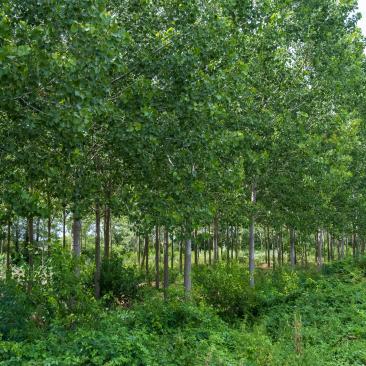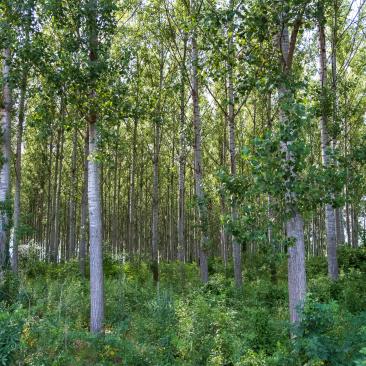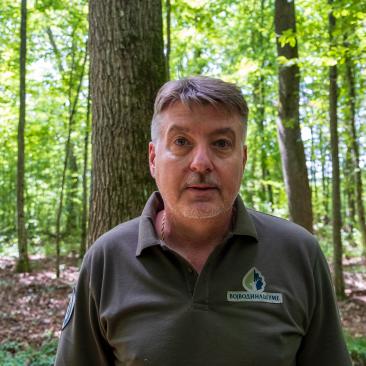
From global to local perspective
Forests play a key role in maintaining ecological balance, supporting biodiversity and mitigating climate change. Recognising the importance of forests, there is an increasing emphasis on the practice of sustainable forest management, including the establishment of forest plantations on abandoned agricultural lands and other non-forest lands. Forest plantations are designed to meet the growing demand for timber, paper and other forest products.
On a global level, forest plantation cover about 131 million hectares, which is 3% of the global forest area and 45% of the total area of planted forests (FAO, 2020). The highest share of plantation forest is in South America with 99% of the total planted-forest area and 2% of the total forest area. The lowest share of plantation forest is in Europe, where it represents 6% of the planted forest estate and 0.4% of the total forest area.
To discuss the sustainable role of the forest plantations, we have visited the public forest management company Vojvodinašume Petrovaradin in the Autonomous Province of Vojvodina, Serbia. This FSC-certified FM company manages 24,5 thousand hectares of intensive poplar plantations, which is nearly 19% of the total forest area under their management, 14.0% of forest area in the Vojvodina province, and 1.1% of forest area in Serbia.

The Need for Forest Plantations
While the value of environmental services from natural forests is higher than that from forest plantations, plantations can provide most goods and services that are provided by natural forests. Here are some key benefits:
-
Meeting Growing Demand for Wood and Fiber
As global populations and economies expand, so does the demand for wood and fiber. Forest plantations provide a controlled and sustainable source of these resources, reducing pressure on natural forests. By cultivating fast-growing tree species, plantation managers can harvest timber in a more predictable and efficient manner.
In Serbia, the development of poplar plantations began in 1950s and was consistent until 1990s. The development of wood production in intensive poplar and willow plantations was conditioned by industry requirements for mechanical and chemical processing of wood and limited production possibilities in natural forests. For example, the rotation of clonal poplars is relatively short and lasts 25 years, in contrast to the oak, whose cycle is much longer (150-160 years).
Today, intensive plantations of poplar and willow in Serbia overall occupy less than 2% of the total forest area with a contribution of about 10% in the growth of wood volume and 15 - 18% in economic effects.
-
Conserving Natural Forests
Forest plantations serve as a strategic tool for conserving natural forests. By meeting the demand for wood products through cultivated plantations, the pressure on pristine ecosystems is reduced. This helps to preserve biodiversity and protect fragile ecosystems that might otherwise be exploited for timber and other resources.
This is true for Vojvodina Province, where the production of wood in intensive plantations eased the pressures of the wood industry on the provision of raw materials from natural forests to a certain extent. The planting of intensive poplar and willow plantations was mainly carried out on areas of unvegetated forest land and natural willow and poplar forests.
-
Carbon Sequestration and Climate Change Mitigation
Forests act as carbon sinks, absorbing and storing carbon dioxide from the atmosphere. Well-managed forest plantations contribute to climate change mitigation by sequestering carbon in growing trees. Additionally, when harvested timber is used in construction or furniture, the carbon remains stored in the wood products, further aiding in the reduction of greenhouse gas emissions.
In Vojvodina Province the growth of in forest plantations has increased by about 6 times over the last 40 years, thanks to decades of work on the breeding and introduction into production of high-yielding varieties and modern technologies - thus directly contributing to higher rates of carbon sequestration capabilities of the plantations.

Forest plantations and FSC certification
Both natural forests and forest plantations can be certified according to strict FSC principles and criteria, thus ensuring the application of FSC requirements for responsible forest management. One of the conditions for an FSC-certified forest plantation is the allocation of at least 10% of the forest area that should be maintained and restored to natural forest, and not used for commercial logging. Strict FSC standards for natural forests also apply to forest plantations, ensuring equal consideration of ecological, social and economic interests.
During our stay in green Vojvodina, we met with dr Miljan Velojić - an independent professional associate for forest certification and environment within Vojvodinašume FM company and an individual international member of the FSC organisation. We have asked him what does FSC certification mean for the forest plantations in Vojvodina Province. He responded: "The compliance with the FSC requirements has resulted in the trust of current and future users of forest products through the improvement of methods, ways and technologies of forest management, the improvement of the work and operations of the company, which is reflected through harmonisation with nature protection, i.e. the promotion of the preservation of biodiversity and other values of nature protection in forests with sustainable management, influence on social relations with the aim of improving health and safety at work, increasing the rights of workers in accordance with obligations, their training through various employee trainings, improvement of cooperation with local communities and local population, as well as interested parties, the public and simultaneous openness (transparency) in operation, waste management, strictly controlled application of pesticides, and more."

